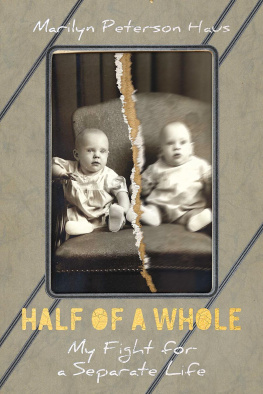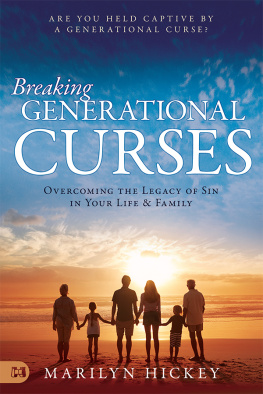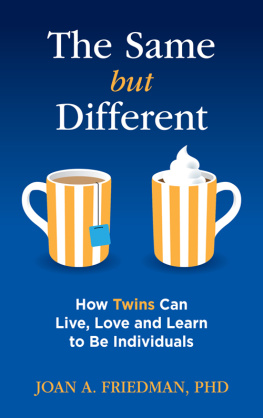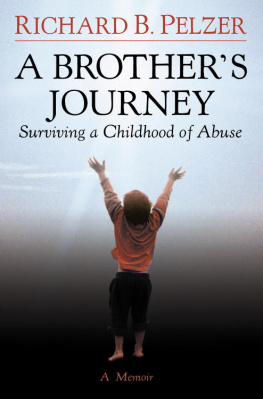Advance Praise for Half of a Whole
I cannot tell you how blown away I was by your memoir. Devoured it, actually. The characters are so real. And your honesty about yourselfthe way you take the reader through those years of figuring it out.
Leslie Bedford
I was in your skin, seeing what you saw, feeling what you feltunadorned, direct, very real and compelling storytelling, but with insight and such intelligence.
Joan Kavanaugh
I thought I would read it at a later time but sat down and read it from beginning to endnot until I got near the ending chapters could I see the full impact of purpose in the writing, its depth and extent, and the title in full bloom.
Marian Ecklund
I could not stop reading your words. Your story is both beautiful and devastating.
Laura Flint
I couldnt put it down! Very powerful. Your journey was intense. I cried with each loss.
Cindy Barham
A POST HILL PRESS BOOK
ISBN: 978-1-64293-934-7
ISBN (eBook): 978-1-64293-935-4
Half of a Whole:
My Fight for a Separate Life
2021 by Marilyn Peterson Haus
All Rights Reserved
Permissions: Ainslie, R. C. The Psychology of Twinship. Northvale, NJ: Jason Aronson, 1997. Excerpt used by permission from the author.
Cover art by Cody Corcoran; concept by Naomi Haus-Roth
This is a work of nonfiction. All people, locations, events, and situations are portrayed to the best of the authors memory.
No part of this book may be reproduced, stored in a retrieval system, or transmitted by any means without the written permission of the author and publisher.

Post Hill Press
New York Nashville
posthillpress.com
Published in the United States of America
Dedication
for my twin
and my mother
There are early, strong ties between twins, ties that foster mutual interidentification between them and serve to cement the twinship psychologically for each twin. In this manner twins become primary actors in each others emotional lives beginning early in their infancy.
The Psychology of Twinship, Ricardo Ainslie
And Isaac loved Esaubut Rebekah loved Jacob.
Genesis 25:28 (KJV)
Contents
W hile writing this book, I relied on a trove of material that I had collected over the decadesstacks of long and detailed letters my mother wrote; my twins and my baby books, in which she recorded our early years; the family histories she wrote; boxes and drawers packed with documents I saved; my school yearbooks; scrapbooks I made; genealogical studies, undertaken by my relatives; descriptions of my dreams, as I recorded them at the time; and research I undertook to better understand the past.
To recreate the characters, conversations, and events, I relied on my memory, old family photographs, and the stories we told. At times, I consulted with my siblings, cousins, and classmates to refresh my memory.
The names of the characters are as they were at the time.
T he admitting nurse thought I was an idiot. I could see it in her eyes. What took you so long? she asked, peering over the top of her reading glasses. Weve been waitingits been hours since you called! Sharon sank into her gold corduroy jacket. My hands trembled in my lap.
What took so long? If the nurse had seen me shaking outside Moms condominium on the frigid Minnesota morning, if she had heard the officer shoutingTry to make it easy for him, and what does he do? Fights like a bull! Has to trash the place!if she had seen him spraying spit in my face as he rantedKicks his way down the hallway! Shatters the glass door with his stocking feet!if she had heard me pleading with him to bring my brother to the emergency room, she wouldnt have looked at me the way she did.
It took six attendants to get him on the gurney, the nurse said, leveling her gaze at me. The first set of shots didnt touch him. Had to give him a second round to bring him down.
I had no idea my twin was so strong. He had never gotten into fights. At least none that I knew about.
My knuckles had turned a bloodless yellow. I unclenched my hands and wiggled my fingers while the nurse moved her pen down the admitting form. Sharon shoved her permed ash-blond hair away from her glasses, left me to do all the talking about her husband.
Hes forty-five years old, the nurse said, noting the date, October 29, 1941, when we were born. Its highly unusual that hes never been hospitalized. The first manic episode normally occurs in the early twenties.
She stared at my stunned face. I stared back.
Are there any people in your family who are manic-depressive? she asked.
No. Everyone in our family is fine.
She set the clipboard down and removed her glasses.
This type of mental illness is very difficult to diagnose. If theres any history, any people in your familymaybe an aunt or an uncleinformation like that could help us determine whats going on with your brother.
The nurse watched me as I opened and closed my hands, rubbed my knuckles. I wanted to tell her how Dr. Dowswell had never heard a second heartbeat; how Mom had said I told you so! after she gave birth to my twin; how Dads face had broken into a proud grin in the picture she took with her Brownie box camera, one baby on each knee. Marilyn and Marvin. A girl, and finally, after waiting so many years, the boy he had wanted. But the nurse wouldnt care about any of that.
I remember one time when Marvin seemed nervous, I said.
What do you mean by nervous? she asked, squinting at me through her glasses.
Nothing. Just that he seemed tense. I wanted to stop talking, but she kept staring at me. He was on leave from Germany and came to visit George and me. We were living in Connecticutwed only been married a couple of months. I remembered how his eyes had flashed with anger, his pale face turning a deep red as he pounded the table while arguing with the long-distance operator. It wasnt like him, I told the nurse, talking to the operator like that.
Go on, she said, as she scrawled notes on the form.
Years later, Mom had told me about the rest of his leave, which he spent with them, how Pastor Folden had driven to their farm to tell her he thought Marvin should see a doctor. I asked her what caused Pastor Folden to make such a shocking suggestion.
Well, anyone could see that Marvin was nervous, she said, swatting her curly red hair away from her face. I told Elsie what the minister saidshe said Pastor Folden should be taken out and shot!
I never dared to bring up the subject again.
I didnt bring it up with the nurse. She would have made too much of it. I did tell her about the scar on his arm, how it had always bothered me. One time I asked him about the thick, jagged mark. He said, I got it in the military. I asked if hed been in a fight, but he clammed right up. I knew better than to ask again.
Thats all I can think of, I said to the nurse.
She turned to Sharon.
Anything come to mind?
No, I cant think of anything.
Sharon didnt mention the night, six years earlier, when they were at the farm for Dads funeral. The rest of us had hovered over him in his hospital bed, but Marvin sat at the side of the room, not saying anything, as our father lay dying.
After the burial, I heard Marvin cry out in the middle of the night. Sharon was sleeping beside him. She had to have heard the anguish in his voice as it echoed through the silent house.













